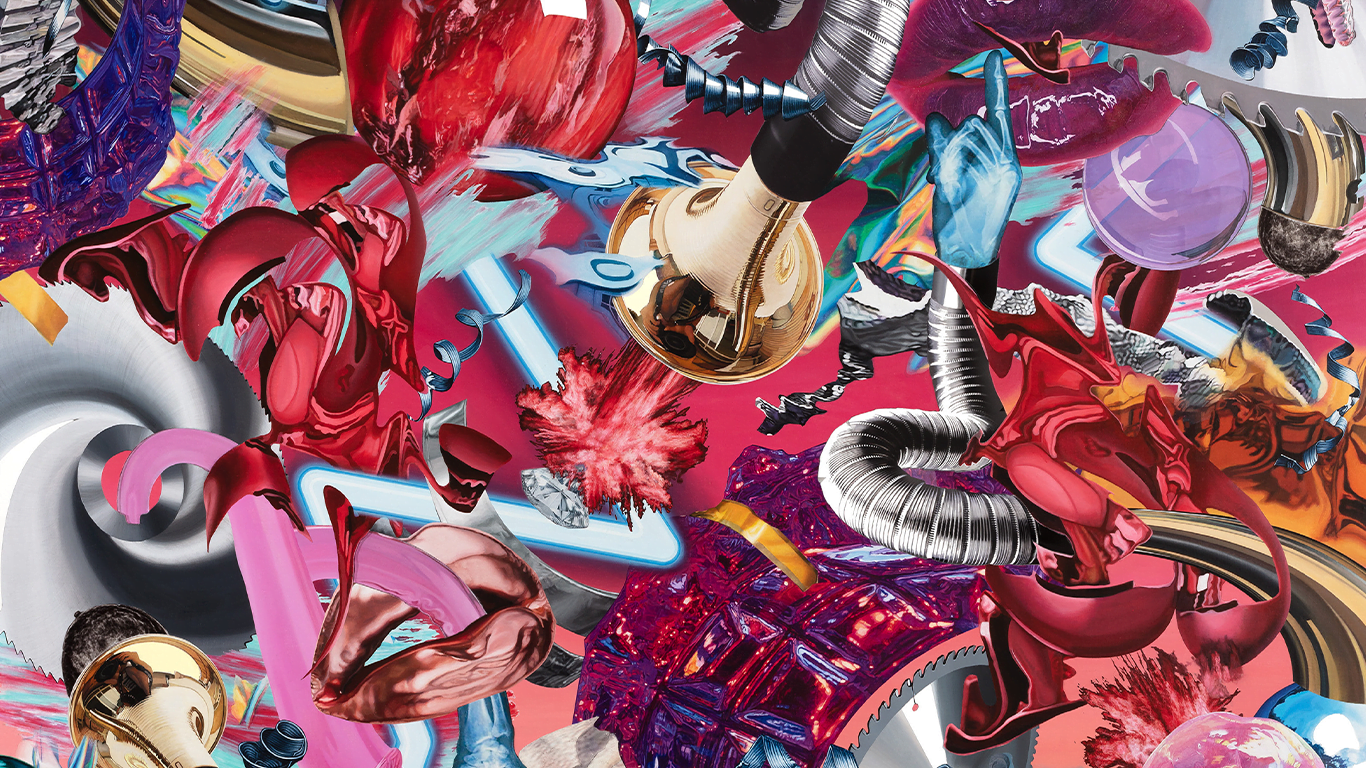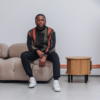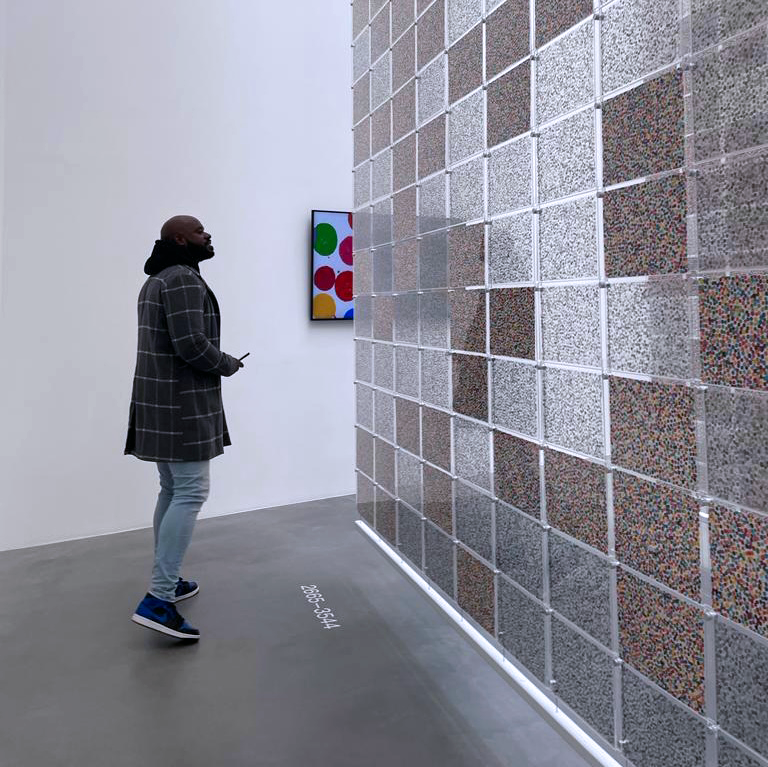Emerging Chinese artist Yuan Song delves deep into themes of consumerism, exploring the allure of tangible objects and the interplay of reality and illusion through a versatile practice that spans painting, installations, and mixed media. Song creates intricate sculptures, from glossy mannequins to neon lights, steel pipes, and industrial materials.
Infusing his canvases with vivid depictions of consumable objects, Song uses shards of glass and offcuts of mirrors that transcend mere decoration. Strategically employing mirrors as instruments of introspection, he invites viewers to reevaluate their perceptions. Their reflection becomes one with his canvas as they see themselves in an era dominated by the gloss and glitter of mass-produced, often deceptive, commodities.
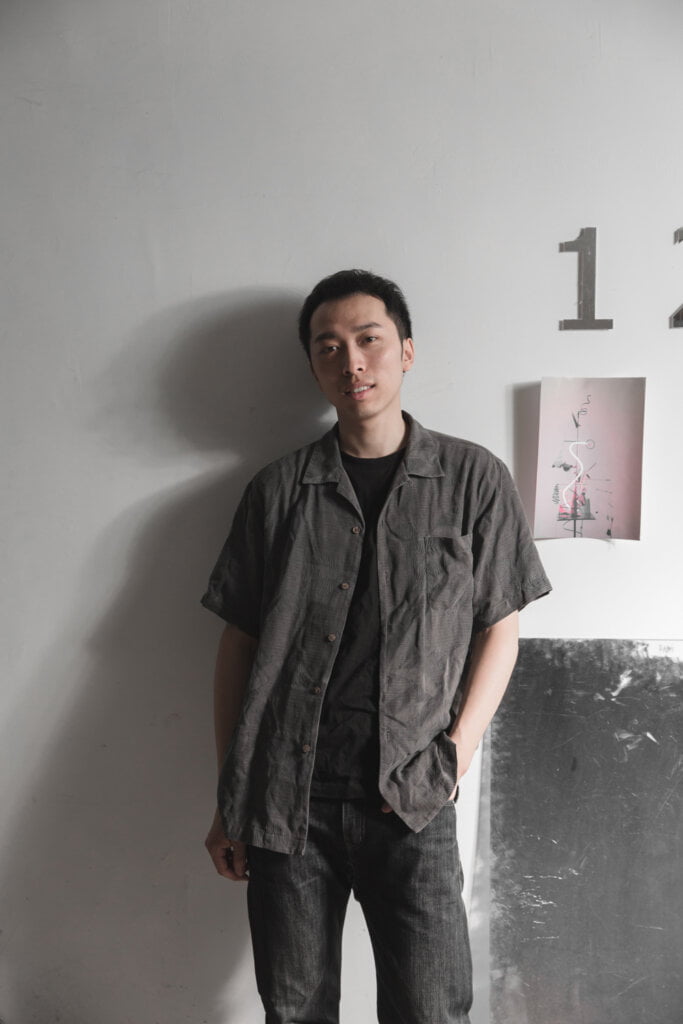
My work covers painting, installation art, and integrating numerous different media. It mainly discusses some phenomena and connotations of current consumerism. At the same time, I research the relationship between reality and illusion
Yuan Song
His material choices extend beyond personal preference; they capture the cultural nuances of his environment and resonate with China’s rapid ascent on the global stage, creating a bold narrative. Song melds various facets of consumer culture to illuminate the complexities of our modern existence, highlighting the ever-present tension between the tangible and the illusionary. He compels us to reflect: In our consumption-driven era, are we discerning the real from the mirage, or are we lost in a complex maze of illusions?
Born in Tianjin and now based in Beijing, Song holds an MA in Fine Arts from the Department of Experimental Art at the Beijing Central Academy of Fine Arts. He also teaches at the Tianjin Academy of Fine Arts and has exhibited across China. Song’s work is a dazzling metaphor for contemporary life.
Yuan! How are you doing? Thank you for taking the time to speak with us. Please introduce yourself to those who do not know you.
Yuan Song: Hi, Len. It was a pleasure doing this interview with you. Let me introduce myself. My name is Yuan Song. Surnamed Yuan, Song means pine tree in Chinese. I am a young artist born after 1990. Born in Tianjin, China, and graduated from the Experimental Art Department of China Central Academy of Fine Arts. In addition, I am now teaching at Tianjin Academy of Fine Arts, which is also my Alma mater from which I graduated.
So now, I often work in Beijing and Tianjin, China. My work covers painting, installation art, and integrating numerous different media. It mainly discusses some phenomena and connotations of current consumerism. At the same time, I research the relationship between reality and illusion from this problem and try to achieve a response to such a discussion by inlaying a sense of difference brought by other material materials on the painting. So you must see the work on the spot to see the clues. It’s very close to my personality. I always want to pursue a kind of “Oh! So that’s it!” This is my hobby. Of course, I also have many other hobbies, such as making music and looking at the universe through telescopes.
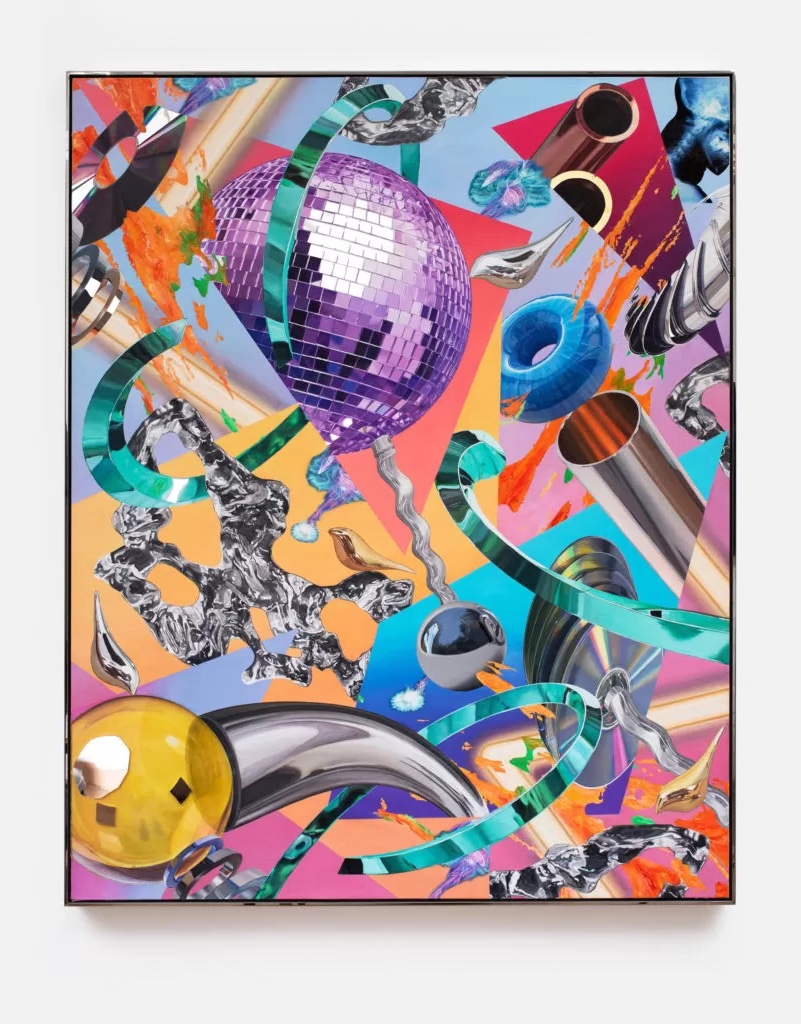
acrylic on canvas\plexiglass\mirror stainless steel\x-ray film
Can you tell me about how you became an artist? What were the crucial moments or people that inspired you to follow this path?
Yuan Song: I have been fond of painting since I was a child. When I was young, China’s development was still in its infancy, and many families were not so wealthy. My family was selling cigarettes, so I would stockpile many cigarette boxes, cartons, etc. There was no money to buy toys, so drawing pictures on cardboard boxes and using cigarettes as blocks, and building sculptures were my main childhood games. My father recognized that I had such a talent and was willing to pay for my hobby.
When I was in the third grade of primary school, he took me to learn painting formally. What inspired me to persevere as an artist, my father and a teacher in my painting class during the college entrance examination kept me on the path as an artist. My family is not so wealthy, and studying art in China requires sufficient economic strength, so I am very grateful to him for his constant efforts to support me.
You know, the environment I was raised in it was even unthinkable and risky. And that teacher, before I entered the Academy of Fine Arts to study art formally, showed me a lot of contemporary art magazines, which broadened my vision and made me aspire to the traditional Chinese-style college entrance examination art and become an excellent contemporary artist. During that time, I constantly desired to pursue a higher level. However, from my own experience, I have come this way, and to some extent, it is because of what the Chinese often say about fate and destiny.
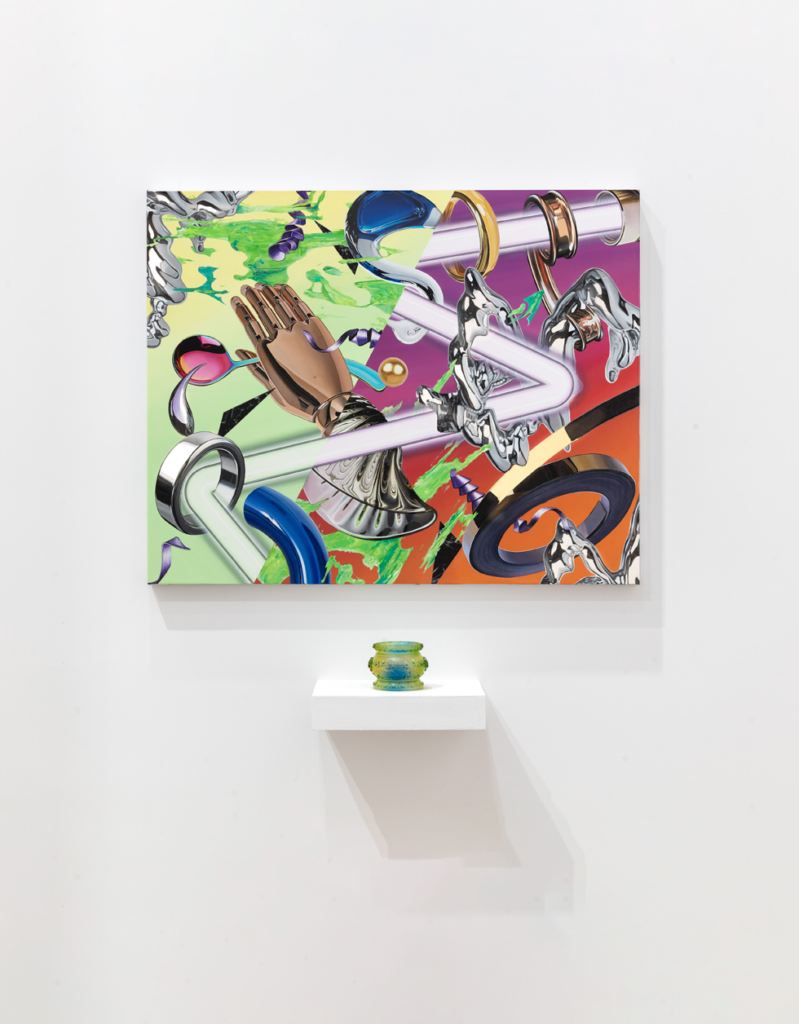
Throughout your practice, you navigate the realms of consumption, consumerism, and the paradox of reality and illusion, utilising numerous mediums, including sculpture, mixed media, and installations. Let’s delve into your practice to understand why these themes are important to you.
Yuan Song: In fact, in the budding period of creation, I did not suddenly realize the topic of concern now. But through the exploration of the material, slowly discovered. During my postgraduate studies, I involuntarily collected a lot of materials that I thought could be used, and took some pictures of objects in daily life and their forms that could be put into work. Gradually, I found that a large number of everyday ready-made or consumer goods in my environment were made into shiny surfaces, many of which did not need this quality and would not affect their use.
There are also many goods that, simply because of this feature, become so-called “pro” versions. But the technology itself and the consumer goods themselves are not expensive. It seems to me that the “highlight” here is some kind of fancy dress that inspires people to buy. On the other hand, I also thought, why does it appear so much in the environment I live in? In my mind, it seems that this has something to do with the rapid development of China.
In my opinion, this discussion can be pursued in a larger background based on my own environmental experience. In addition, it is directly related to many ready-made materials, and most of the creation factors have emerged, so it is natural to create my VIEW series works. So I started putting these materials in neon light boxes to amplify their magnificence and emptiness. I use them for device assembly, to produce some linguistic logic, and to represent reality in imagery.
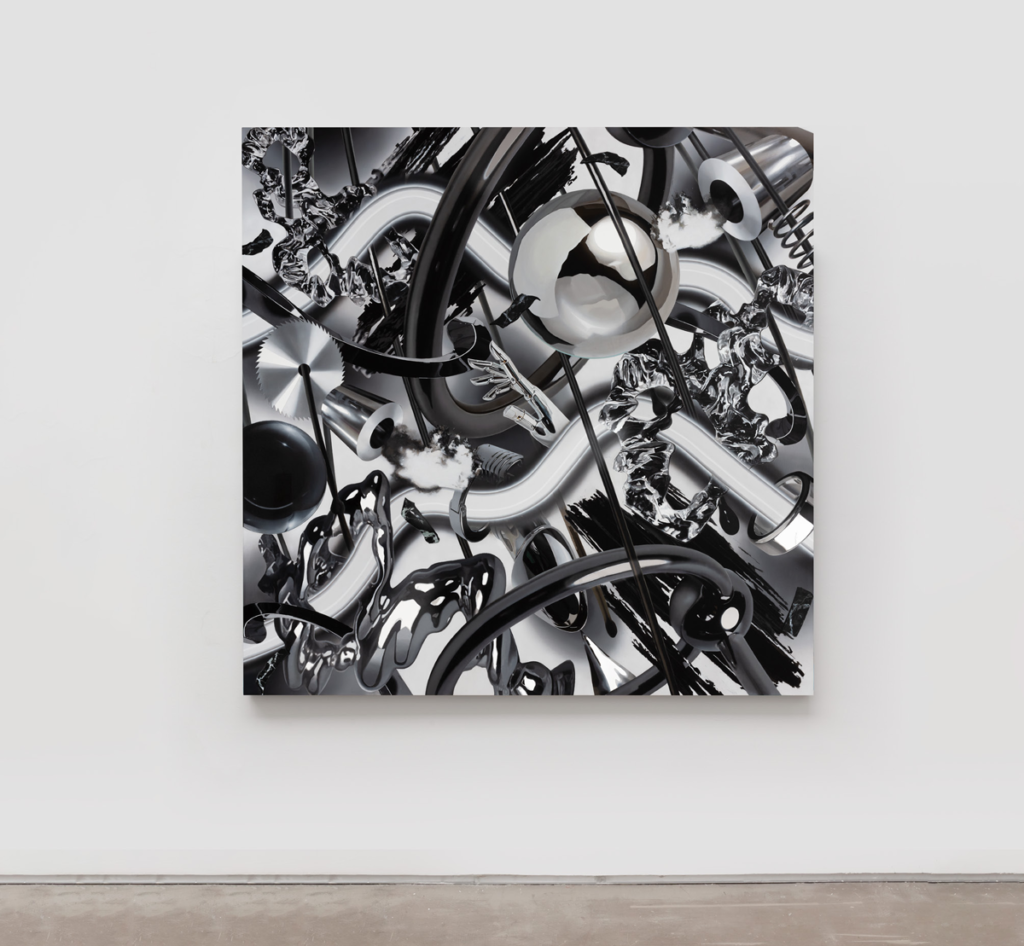
acrylic on canvas\plexiglass\mirror stainless steel
In recent years, with the further development of the network, people’s life is becoming more and more flat. Two-dimensional life is no longer a prediction but the arrival of madness. Human life is no longer three-dimensional, which also encourages my creation of easel paintings. In my living environment, As I observe people’s daily lives, I notice numerous new challenges arising. These include conflicts between different professions, family relations, gender, and more.. Behind all these troubles are such problems about goods, consumption, reality and illusion, etc, which will create a lot of unrealistic ideas in people’s brains, confusing people not to think and just blindly believe them.
For example, commonality as personality, illusion in reality, equality and fairness are confused. Even in my summary, their “highlight” is as much the result of an external form as it is the temptation to give birth to these contradictions. So I think I need to try to uncover such a veil, which is closely related to the environment I live in. Therefore, I used some material to embed in the plane painting to create the series of Highlight works.
When I look at the scene, while ensuring the two-dimensional plane, subtle visual differences can be generated between them, creating a kind of “specious” illusion that is difficult to judge authenticity. Many of my works use mirrors, which is that I hope the audience can see themselves in the works is part of the work, which is a summary of my current living environment.
Continuing, can you talk us through your creative process? How do you select a subject, and what does the process look like from the initial idea to the finished work?
Yuan Song: In the “View” category, the same theme is discussed. Visually, it is also relatively abstract. In the light box, I will start by manually making the base of a mirror light box, and then try to add different “highlight” object materials into it, repeatedly putting them in and taking them out, so as to create some organizational relationship between them and neon lights. These combinations will give me some images and associations which come from my perceptual cognition of life.
Whatever my questions are, I try to organize them into what I think the concept looks like to me. The creative logic of the sculpture installation is similar. Through the collocation of materials, I try to get close to the order I feel. Each individual is seen in the collective, but the individual also constitutes a significant collective. Finally, I will hand over my manual model to the factory and make it 1:1 into a more exquisite finished product.
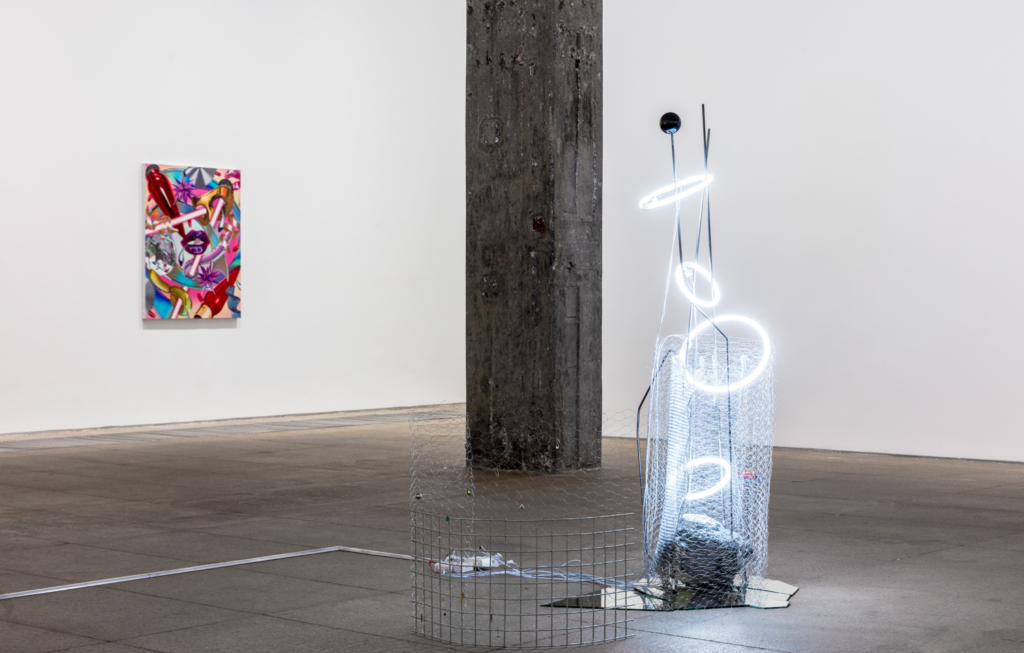
Building on that question, are there any artists, art movements, or sources of creativity that you find particularly inspiring or look up to?
Yuan Song: Among them, my mentor, the artist Wu Jian’an, inspired me greatly. I learned a lot from him about ways to deal with difficulties in creation, as well as creative themes and approaches to the birth of ideas. At the same time, I also learned a lot from him and another mentor, Lv Shengzhong, about the ability to penetrate topics worthy of artistic creation in real life. Of course, almost all artists and movements in world art history have brought nourishment to me. It is worth mentioning that in the aspect of contemporary art, I like Sarah Sze very much. Her ability to control materials, her ability to organize creative language and her explosive power reflected in her works have amazed me. I have always followed the example of her achievements.
In Highlight, a lot of specific images are used, so the thematic trend is more clear. These themes are the ones I talked about in my answer to the previous question, the so-called perplexities or paradoxes in the environment. For this series of works, I will collect many related images daily, cut them down by computer, and then classify them according to function, shape or feeling. For example, I would think of a topic about gender relations, and I would choose from the images that were relevant to that topic and interweave it. The organization here also makes images intersperse with each other and “bind” each other to produce many images and visual associations related to the theme.
The images are also changed over and over again. Finally, I will draw a certain image, and inlay mirrors, glass and other materials in some corresponding “highlight” positions. The selection of the inlay position is the highlight position of the image itself so that under the irradiation of space and light, real light appears on the fake image, and the effect comes out.
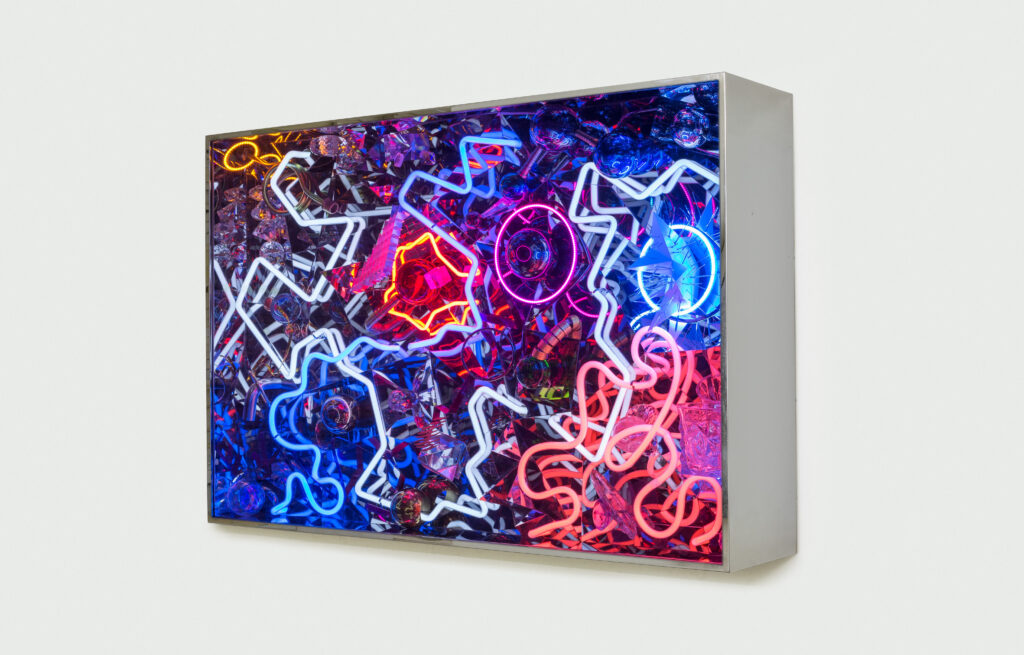
light box instrallation 2017
You studied an MA in Fine Arts, part of the Department of Experimental Art at the Beijing Central Academy of Fine Arts. Could you share insights about this program, the experience it offers, and how it has enriched your artistic expression?
Yuan Song: Ha ha, actually, I graduated many years ago, but the experience of studying there was quite unforgettable. Compared to other majors, experimental art is still relatively avant-garde in China. Although it does not claim to be avant-garde, the experiment itself is a process of constant renovation, even if it borrows from traditional culture. When I was at school, my mentors were the leading artists in contemporary Chinese art at that time, and they were also the idols of our school days.
Their various experiences have been beneficial to me. For example, I can have access to different creative methods of different tutors, among which there are always some points that I can grasp. Then these points in different directions can be combined to form my own unique creative language. Also, there will be many more excellent exhibition opportunities in contact with them, and I can also learn a lot about their ways of dealing with people in the art world.
At the same time, the students there also gave me a lot of help; although it was unconscious, the learning atmosphere was very relaxed and happy. I think it is very important; it can naturally stimulate everyone’s creative desire and instinct. These will undoubtedly enrich my vision and mind, and artistic expression will naturally expand.
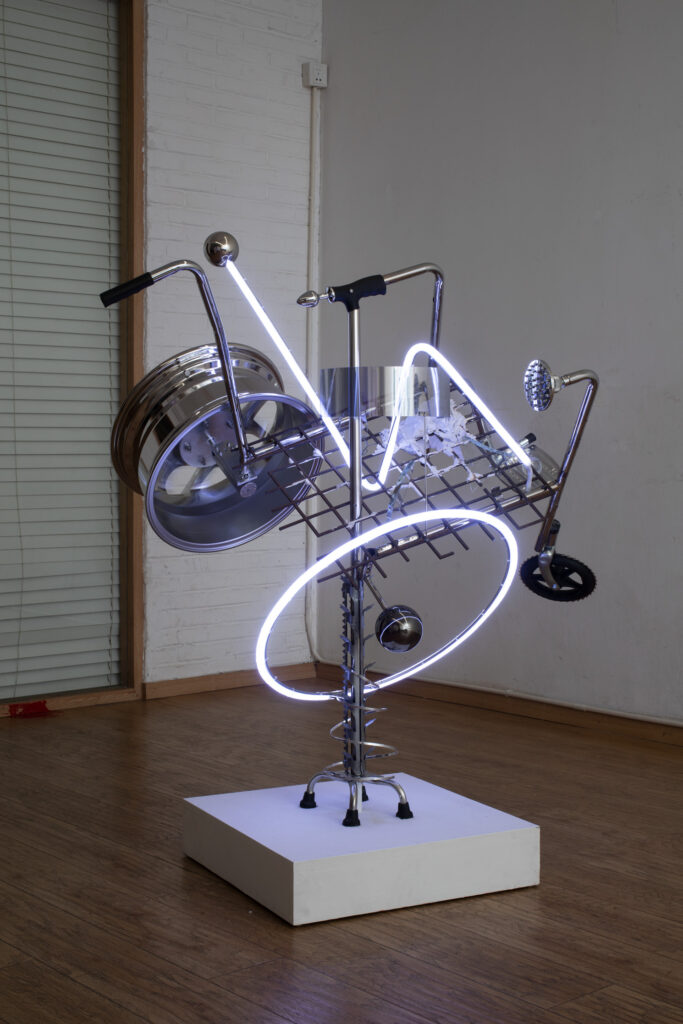
electrical machinery installation 2021
As a Chinese artist actively engaged in China’s contemporary art scene, could you shed some light on the current movements and dynamics within China’s art scene? Does this influence or shape your artistic practice?
Yuan Song: One noticeable trend is that many people are returning to painting, and even those once known for their performance art are starting to create works on shelves. And the once-famous predecessors also began to paint fresh colours. Of course, the art market must be involved in this, yet it may also be related to the “flat living environment” I mentioned earlier. Of course, this has influenced my creative work in some way, but my creative experience is naturally formed that it can’t be said to be shaped.
The studio holds immense significance for an artist that serves as a sanctuary for artistic expression. Can you share three indispensable items that you need in your creative space?
Yuan Song: Apart from the necessary tools for creation, laptops must be the first thing. I can’t do without it for the images and models in my creation. In addition, I like computers because it has more operational possibilities than other tools. Bluetooth speaker. I like music, and I also like to have a sound when I’m working, but it’s not a conversational sound, it’s a background sound, and I often listen to radio chat shows while I’m working. My work suit, when I work, I must have a special set of working clothes and my slippers. Every time I go to the studio, I first change my clothes, which makes me feel comfortable when I work.
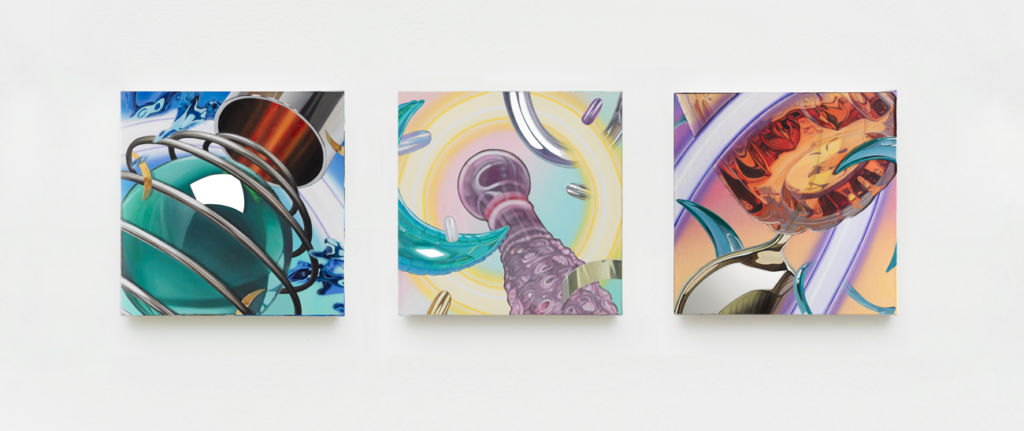
acrylic on canvas\plexiglass\mirror stainless steel
What’s next for Yuan Song?
Yuan Song: In terms of work, I will continue to dig deeper into the series I have created so far. There are still many interesting possibilities to explore. In addition, around my previous theme, I have developed many new ideas, which may be more direct about visual authenticity judgment in concept or about the relationship between materials and space in vision, and I am ready to try to do some experiments; I’m looking forward to it.
Lastly, what does art mean to you?
Yuan Song: This is a difficult question to answer because I have lived with it for over 30 years in this world. But life itself is complex and concrete, and so is art. As if we treat the world, always bittersweet, love and hate, it is just like the world. I don’t like to say it’s my life, my whole life or anything. I also have my own expected life, which is not necessarily related to the so-called professional art, but may be inseparable from art. Maybe for me, art is art. It doesn’t mean anything.
©2023 Yuan Song


